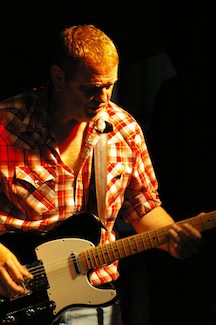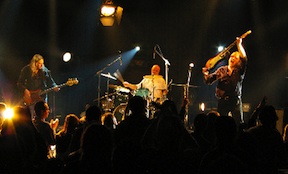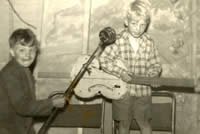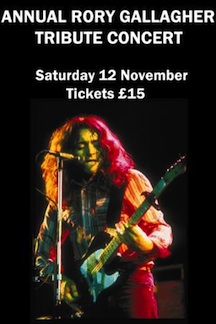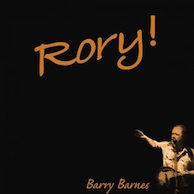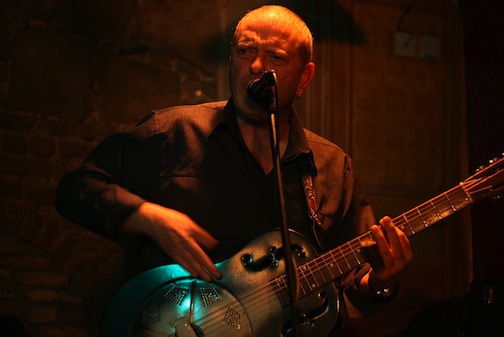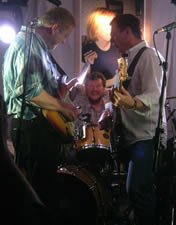Nov 18 2011
The Ghost of Rory Gallagher — by Jim Fusilli
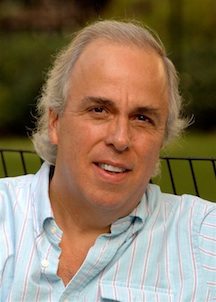
Jim Fusilli is the Rock and Pop music critic for the Wall Street Journal. He is also the author of six novels. His latest novel is Narrows Gate, an epic tale set in the years surrounding World War II in the city’s Italian-American community. He has also contributed short stories to various anthologies including “Chellini’s Solution,” which appeared in the 2007 edition of the Best American Mystery Stories. Of particular interest to Rory Gallagher fans is a short story Fusilli wrote that was included in Ken Bruen’s 2006 short story anthology, Dublin Noir: The Celtic Tiger vs. The Ugly American. The title of Jim Fusilli’s story is “The Ghost of Rory Gallagher” and deals with an unrepentant white collar criminal who is finally laid low by his obsession with Rory Gallagher bootlegged recordings. The idea for the story came from a chance attendance at a Rory Gallagher tribute night at New York’s Bottom Line Cabaret in 2002.
A buddy dragged me to tribute show at the Bottom Line a couple of years ago, and Rory’s family was there and a bunch of good quality Irish musicians. It was a kind of a middling show with a lot of high spirits. The last guy was this kid from Red Bank, NJ, and he was unbelievable. A total buzzsaw on a beat-up old pre-CBS Strat. Stunned, my mouth hanging open, I said, “That’s the ghost of Rory Gallagher.” Not long after, Ken Bruen asked for a story for “Dublin Noir.” — Jim Fusilli
Jim has graciously allowed me to post the story here. Be sure to check out his latest novel, Narrows Gate at Amazon.com.
The Ghost of Rory Gallagher
HE’D LEFT LONDON in disgrace. A banking scandal, one of the worst. More than a half-billion pounds sterling in losses, bolloxed up every trade he made for months, going deeper and deeper. The end of days for the 230-year-old Ravenscroft Bank. Hundreds sacked. Pensions gone. Dreams shattered. Suicides, at least five of them, including Desmond Chick, for thirty-eight years the janitor at the Con Colbert Street branch in Limerick, a widower, raised three sons himself, working dusk till dawn. Sent away without so much as a plaque for comfort, he cried himself to death, they say, too old to start anew and as heartsick as if he’d lost his Minnie all over again.
The trader, meanwhile, was sentenced to four and a half years. Got out in three. Good behavior, though the arrogant shite never owned up to what he’d done. Eleven hundred days in Coldbath Fields and every one spent planning to cash in like Nick Leeson did—a book, Ewan McGregor on the silver screen, lectures—his reward for breaking the Barings Bank in ’95. Now you can play poker online with Leeson, punters thinking, Here’s yer guy, he’ll ride a bad patch straight to hell.
None of that for this trader, save a photo that went on the wires: scowling, bruised, itching, hollow eyes darting this way and that, maybe two stone lost to labor. No publishers, no producers; banking scandals old news now, a story already told. His wife gone off with an orthodontist, moved to Hamburg. Not even a word from his mott Trudi, tossed aside by the Sun after she told of their life together, all coke and cognac, laughing at regulators and the likes of Desmond Chick before they tracked him down.
Ah, Trudi, bleached-blonde and beyond plump, a hostess now at the Odyssey in Bristol, and she knows her time has passed. Her fifteen minutes and all. Let the Remy warm her belly and she’ll talk the ear off a man’s head, give him something she never told them at the Sun. “Ever hear about the only time he expressed regret? No? Well, Ducky, we were in that big comfy bed of his in that hotel in Tokyo, and he props up on his elbows, and he says, ‘Trudi, they can keep it all, the bastards. Every last piece, every last shilling. But I’ll tell you, I’d give my left thumb to have back my old guitar.’ That being what they call a white-on-white 1961 Fender Stratocaster. Owned and played by Rory Gallagher, it was. Rory Gallagher, love. Sure, you heard of him. Rory—Rory Gallagher, for fuck’s sake . . .”
As for the trader, the bitter prick, still thinking who he was, packed up and disappeared. Did a good job of it too. Four years gone by now, and not a word. Man barely qualifies as a bit of trivia these days. Funny, isn’t it? Sometimes, when the world is turning and the craic is good, it almost seems as if it had never happened.
The trader, clever man, re-emerged in Dublin, just another stranger brought in on the wave of the Celtic Tiger. Had a plan, he did: shaved his head, and when his auburn hair grew back he had it done blond and spiked. Put 80,000 miles on the Audi, nose redone in Nice, jaw in Seville. Teeth in Milan. Didn’t have to do much about the accent. Born in Sligo, he was, not London, as he claimed.
As for wardrobe: gone were the Spencer Hart suits, Turnbull & Asser shirts, Hermès ties, Fratelli Rossetti shoes. Would’ve run around like Kevin Rowland, scruffy Dexy himself, Come on, Eileen, if he could’ve, if it wouldn’t have drawn eyes. Instead, old jeans, T-shirts, a gray Aran sweater, and a brown knit, and he put holes in the elbows with a Biro, having tossed the Parker Duofold. (Not true: like all else, the fountain pen was seized and sold at auction.)
Figured now he could hide in plain sight, more or less.
With all the expenses, he still had about 300,000 euros stashed here and there. No one knew, not even Trudi.
Decided to buy himself a perch and look down on the world, laugh as the rabble passed by. But then it came to him: no, he wanted his nose in it, wanted to smell the stench of ordinary life, to listen to the love song of the forlorn, revel in their petty grievances, in their miseries, watch as the bloody stasis took hold, watch as the light dimmed and died.
The trader bought himself a pub.
A dump over on the north side of the Liffey, off the Royal Canal, a regular shitehole it was, a right kip. Entrance in a stone alley beyond mounds of rubbish, and you couldn’t stumble upon it without a map. Celtic Tiger, my arse, it seemed to say. Two steps down and the rainwater flooded the drain, and that was all right too. Mold and rotten wood, the floorboards sagging.
The place reeked of failure, of resignation.
Perfect.
“Welcome home, you bastard,” the trader said as he
stepped over the moat, dusted his hands, coughed.
It needed a name, didn’t it?
The trader, who by now was calling himself Eamonn or English Bill, depending, thought about it, and his first instinct is to call it “Rory’s.” No, “Ballyshannon,” after Rory’s birthplace. “The Calling Card,” that’s a good one, after Rory’s–
“I must be out of me feckin’ mind,” said English Bill to no one.
Which wasn’t far from true now, was it? Talking to shadows, the cobwebs: took more than one roundhouse to the side of the head in the community shower in Coldbath Fields, he did, though well short of what he had coming.
Pitch black now in the pub and he doesn’t know it, maybe his eyes have gone weak again. Thinking a little crank would do him good.
“The Rag and Bone,” he said, his throat feeling like he ate sand. Thinking of his childhood, and Yeats.
Yeah, and soon tour buses are parking out front and the Japs are snapping photos, thinking they’ve tripped over history.
Back to square one, and two hours later, still not a clue.
And then another hour after that, come and gone.
Cheesed off, he came up with “Póg Mo Thóin,” as in “Kiss My Arse,” but he let it float, and he fell asleep on the bar, woke up to the gnawing and cheep-cheep chatter of a rat inches from his skull.
Got up, pissed in the sink when the jax was two feet away. Cupped his hand and took a mouthful of brown water, felt the rust wash over his Italian teeth.
Soon, sunrise and thin white light through the veins in the painted windows, and he can see the booths against the mudbrick walls, drunk-tilted and ready to fall in on themselves, creaking even in the shouting silence, and who’d give a shite?
And then, like inspiration, like Yeats dreaming, “Cathleen Ni Houlihan,” it comes to him: “Desmond’s.”
Brilliant.
But he don’t know why.
“Desmond’s,” and he likes the sound of it. “Desmond’s.” Likes it because it don’t mean nothing.
They started coming within minutes after the Guinness and Murphy’s trucks pulled out, smelling it as they stumbled along, squat little men, and they were the dregs and had nothing to say. The same story, again, again: never had a break, this bastard or that, she was hell on earth she was; ah, but me dear sweet mother, I’ll tell ya, and me da, Fecky the Ninth he was, but, God, I loved him. Sitting but a stool apart, three, four of them, each brutalizing the same tune. Clay faces in the flicker of cheap candles, a motley bunch straight out of Beckett, and moths flew up from under their tattered greatcoats.
The trader wanted entertainment, stories of the long, long fall, and soon he realized he had put Desmond’s at the end of the shite funnel, and who but them was going to appear?
“Jaysus,” he said as he rinsed a glass in foul water, “the sin of pride, my arse.”
“What’s that you say, Eamonn?” asked one of the sagging men, spider veins, rheumy eyes, fingers stained piss-yellow, paralytic before noon.
“I said, ‘Get the fuck out.’ All of you.” Shouting, bringing it from the bellows. “You and you and you!” Finger stabbing the air, and there’s the door. “Out! O. U. T.”
The men shrugged, plopped down, hitched up their trousers, and slouched out, forearms a shield from the sun.
And then the trader made a mistake.
He jammed the bolt across the door, poured himself a
pint to wash the crystal meth off the back of his throat, went into a threadbare carton, and dug out Rory’s BBC Sessions, cut in ’74 but released when he was in Coldbath Fields, four years after Rory died. Whipsnap “Calling Card,” “Used to Be” like a cold knife against yer skin. The trader blasted it, oh did he blast it, and they heard it in the alley through the cracks, the ancient splinter wood, rattling bricks. The trader had every piece of music by Rory Gallagher that was ever recorded—all the officials, bootlegs too, bits of tape, third generation copies; snatches of solos, rehearsals, sound checks, Rory turning the white Strat into a chainsaw, Rory levitating.
The bastards didn’t get the trader’s stash when they sent him up, the pricks, they let his lawyers cart it away; and he could tell you which was the solo in “Walk on Hot Coals” on Irish Tour ’74 and which was the night before, two nights hence, thanks to some boyo who smuggled in a recorder under his coat. The trader had twenty-one versions of Rory doing “Messin’ with the Kid,” one more kick-ass than the next, and he blasted every one of them, and more, for four days and nights straight, shaking Desmond’s to its foundation.
And when he opened the door, they were lined up halfway to the Liffey, shivering in the cold, shuffling, frozen fingers tucked under their arms. Hopeful eyes now. Expectations.
Word was a Rory pub was opening by the Royal Canal, and they wanted in. Rory was their man. Rory pushed the
blood through their veins, and if someone was going to pay him tribute, they were going to be there, ice and snow and wind and hunger be damned.
“What the fuck?” the trader said, squinting against the silver light, suddenly wishing he hadn’t the need for more crank and something other than stale crisps.
By 8 o’clock they were three deep at the bar, totally jammers, and the snug was swollen, and Rory wailed, setting the fingerboard ablaze, and the trader had hired himself a bouncer and a lass to clear the tables. The next day he needed a man to pull the taps, and a plumber to fix the jax.
By the time he closed on Saturday night, he’d netted 1,100 euros on nothing but beer and Rory. The guy from the chipper round the block offered him a stake, saying business tripled since Desmond’s was born, thinking he’s on to the new Temple Bar. The Black Mariah pulled up, the Gardaí came in, and the trader prepared to slip them a gift, “Sinner Boy” pounding the walls and all, but they loved Rory too and as long as no one lit up a fag and the coppers got in, Desmond’s was sweet, at least for now.
“Jaysus,” the trader said as he made a neat stack of his notes, “the whole country’s full of eejits.”
He folded the bills, crammed them in his pocket, and wasthinking he’d found justice. Finally, he told himself, he was getting his due.
He did the lass on the cold floor, ripping her from behind, and she went home in tears, mascara running down her baby cheeks.
A week or so later, past closing time, but the little pink man in the far booth stayed glued to the wood, though the power had been cut and the votive candles gave little light.
The bouncer was in the alley, tossing them off cobblestone, so the trader, his ears ringing, went across the beersoaked boards.
“Thinking of moving in, are ya?”
The little pink man reached into his coat and placed an ergo machine on the tabletop.
The trader blew onto his hands, the chill returning now that the crowd was gone.
Suddenly, a piercing note from a Stratocaster split the air, followed by a blinding flurry that knocked the trader to his heels.
The music continued for almost four minutes, burning ice daggers, an angel blasting pure light. Pinwheels, butterflies, blood spatter on virgin walls. Grace.
Neither moved, the little pink man starting intently at his enraptured host.
“Where’d you get it?” the stunned trader asked when silence returned.
“It” being a Rory he’d never heard.
Little Pink Man eased back toward the brick.
“Well?” the trader repeated. The crystal meth had him pumping nitro, bugs crawling on his lungs, and yet it had
been Rory, beyond doubt.
In a small, eerie voice, Little Pink said, “We call him up, is what we do.”
The trader frowned, scratched the top of his head. “Listen, just what’s your game—”
“We call him up and up he comes,” Little Pink repeated. “Now, for someone like yourself, that is all and more. A mystery, true. But all and more, is it not?”
The trader couldn’t focus to study the visitor, there in his too-big hound’s tooth, his black tie pulled tight to his pink neck. Nose a ball of putty, a hint of an impish smile.
Little Pink reached with a translucent finger, popped open the machine and pointed to a silver disk much smaller than a standard CD. Candlelight skittered across its surface.
“Take it,” Little Pink said as he wriggled out of the snug. “Take it and know there’s more.”
The top of the man’s head, covered in curly red hair, sat below the chin of the trader, who had snatched up the disk as if it were the gold of Magh Slecht.
“Who are you?” His accent slipped, revealing his years far from home.
Little Pink turned up his coat’s collar, the darkness carrying a chill. “I’m the man who’s knowing how to bring you to Rory, I am.”
The trader watched as the little man leaped the moat and vanished.
A moment later, the bouncer, whizz-wired like his boss, said he hadn’t seen a little pink man, “No, Eamonn, why? And if you don’t mind, I’ll be on me way . . .”
“Lock it behind ya,” the trader said, turning his back.
Pitch black save the light of the player, cranked to the gills he was, listening over and over and over to the guitar solo until near dawn, the hair on the back of his neck up, Rory, Rory, and the trader knew whatever the little pink man wanted he’d get. All of it, the hidden 300,000 euros, the money in the till, the money yet to be made. Desmond’s, if need be. All of it.
All. Of. It.
It took four days for Little Pink to return, four unbearable days, and he brought Fat Pink with him. They stood in the doorway on the business side of the moat, deadpan and composed.
The trader saw seraphs, and he tried to turn off the frenzy in his mind and under his skin.
The bouncer, dim bastard, held them back, being it was past midnight, and the trader had to scramble across the room to halt their dismissal, freezing the dope with an X-ray stare as he grabbed Little Pink by the forearm.
“Come,” he said, almost desperately, “come.”
They went to the little office he’d fashioned out of the storage room.
“Jaysus, where have you been?”
“It’ll cost you,” Fat Pink said, his voice a throaty growl.
“Huh?”
“What me brother is saying is that the ghost appears at no charge, but we have our expenses,” said Little Pink, collar up on the hound’s tooth.
He saw they had not a mind for charity.
“Sure,” said the trader. “Expenses.”
The Pinks kept still.
The trader took a breath. “Go on.”
“We all get what we pay for,” Little Pink said. “In the end, the accounts tally.”
And with that, the trader had found his hitching post. Negotiations had begun.
“But you’ve seen this place,” he said. “Be flattery to call it a dump.”
Big Pink looked askance at the beam an inch or so from his head. The cobwebs had cobwebs, and the wood wore moss.
“Suit yourself,” Little Pink said, with a faint shrug.
The visitors spun slowly toward the door.
“No, no. No,” said the trader, groping again for Little Pink and to hell with negotiating. “What I’m saying is I don’t know what I can raise.”
“Sure you do.” Fat Pink said it.
Little Pink dipped into his pocket: the machine, the button, and this time it was Rory on the twelve-string acoustic guitar, a slow, agonizing, gorgeous blues. No singing, not yet, but pain released from deep in the heart of Ireland filled the musty room. The sweet chirping of blackbirds too, and platinum rain, and yer ma’s tears.
“Oh,” the trader moaned. “Oh, sweet Jaysus.”
The music stopped when Little Pink popped open the
device.
He held out the disk. A gift, and Fat Pink didn’t mind.
“Recorded not twenty-four hours ago,” said the little man.
The trader swallowed hard. “Name your price.”
They settled on 75,000 euros—Little Pink knowing the US dollar was weak—and the Audi. In return, they’d record for as long as the ghost chose to play.
Driving in the rain through Ballsbridge toward Kill o’ the Grange, headlights sweeping across the diamonded windscreen, the trader had it figured. He’d report the Audi stolen before he left Stillorgan Road for the meeting, record Rory, glorious Rory, and then he’d double-back on foot to grab his money, putting the sight of the bouncer’s Ruger MK right between Fat Pink’s googly eyes.
He’d pick up a new set of wheels in Spain and be in Seville by tomorrow noon.
That was fair play to the boys in Coldbath Fields, and he wasn’t too far gone with the beatings and the crank to have forgotten what he’d learned in the yard. A real tutorial it was, day in and out.
The call made, he put the mobile back in his pocket, and rolled down the window, searching for a sniff of Dublin Bay. None, his nose as numb as stone.
“Eejits,” he said to the night air. “Eejits and wankers. Come to rip off Eamonn the barkeep, and look who’s here. The man who broke the Ravenscroft.”
He was still chattering when Fat Pink opened the door to the cottage on a grainy road two rights and a left off Kill Avenue, and there’s yer open field and the black tree branches groping for the indigo sky.
“You’re early,” Fat Pink said, filling the door frame, all but
blocking out the light.
“I got the money.”
The rustle of wings, or his imagination, all too alive.
“Well?” said the trader, who’d left the Ruger in the glove box.
Fat Pink stepped aside.
The wobbly stairwell was his only choice, and he all but leapt from his head when Fat Pink killed the lights.
“What the—”
“Whisht now,” Fat Pink warned as he joined him on the creaking stairs. “Remember what we’re on about.”
“I can’t see,” the trader mumbled. He stopped at the landing, wondering where to go. As his eyes began to adjust, he saw a white knob and started for the door in front of him, but Fat Pink grabbed his shoulder and led him along the banister.
The floor creaked too. The house 200 years old if a day.
And in the room, gaslight.
Little Pink and another guy, bulldog snarl, neck as thick as a post, his melon flat on top.
“This him?” Pug asked.
Little Pink nodded.
The trader squinted and he saw an old table, longer than it was wide, and two chairs. The fireplace had been shuttered a while ago, and the green shades on the windows were drawn.
Fat Pink nudged him in.
“How do we do this?” the trader said, his voice cracking. Darting bees xylophoned his ribs, the march of wind-up ants, barbed wire made of licorice and lace.
Pug took a sip from a half-pint, offered it to no one.
“We wait,” Little Pink replied. He pointed to a chair.
The trader walked in, and the trader sat down.
Fat Pink took the chair to his left. The flickering gaslight made his features quaver and dance.
Leaning against the slate mantel, Pug twisted his head until his neck cracked.
As if anticipating the question, Little Pink said, “Hours, minutes. You never can tell.” He took out his silver machine, set it on the table.
“That’s what you’re using? No microphones? You’ve got no facilities?”
Pug grunted and Fat Pink pushed down a laugh.
“It’s what we use.”
Dumb bastards, the trader thought. You get the ghost in a recording studio and you’re John Dorrences, you are.
He folded his hands on the table, and Fat Pink turned round to Pug, but neither man spoke.
Skeleton key in hand, Little Pink locked the door.
Five minutes later, felt like five hours, the trader sat tall when he heard the snap-squeal of an electric guitar going into its amp, and a quick punch on the strings to make sure it was in tune.
“Calm yerself,” Fat Pink said.
Little Pink nodded toward the machine.
And soon the sound of a Fender Stratocaster filled the room, and the ghost was running his blues scales, warming up, and soon he was toying with some old Muddy Waters lick, and the trader knew his man was working his way to something brilliant. And then the guitar let out a cry and a hole in the sky opened and here it came, lightning and molten gold and, God in heaven, it was glorious.
The trader shut his eyes in bliss.
And Fat Pink grabbed him by the left forearm and wrist, pressing the man’s hand flat on the table, and with one brutal swoop of a hatchet, Pug took off the trader’s thumb.
Blood spurted, and it ran in a river toward the machine.
The trader howled and the trader howled, and he was almost as loud as the guitar, the blizzard of blues notes, the screeching feedback, the beauty.
Pug took off his belt, wrapped it around the trader’s left arm, cutting the flow.
Standing, Fat Pink put his hands on his shoulders, pressed the trader deep and hard into the chair.
Little Pink, off the door and tapped the machine. Silence. Absolute silence, save a man’s agony cry.
“And you had to name it after him, didn’t ya?” Little Pink said, glaring at the trader, his eyes colder than cold.
Pug was digging in the trader’s pocket for the Audi’s keys.
“Desmond’s,” Little Pink went on. “That’s your idea of a joke?”
The trader’s thumb lay on the table, pointing with recrimination at its former host.
“I don’t—Jaysus, my hand. Look at my—”
Little Pink smacked him, and then Little Pink smacked him again.
“My name is Chick,” he said through grit teeth. “His name is Chick, and the man going to your car is named Chick. We’re from Limerick, and we don’t forget.”
“I don’t know . . .” Near shock, the trader blubbered and whimpered. “My thumb . . .”
“Our father was a good and decent man who didn’t deserve to die ’cause of the likes of you.”
Despite the searing pain, the trader was starting to get it. Ravenscroft, and some people won and some lost, but who the fuck is Chick?
Little Pink stepped back and he smiled, and when he smiled, Fat Pink smiled too.
It was Fat Pink—Larry Chick being his real name—who came across Trudi in Bristol, and it was Bernie Chick—him the one that the trader dubbed Pug—who heard about the guitar player over in the States in Red Bank, New Jersey, who could play it like Rory done. Little Pink, who was Paul but went by the name Des to honor his father, put it together. The club off the Royal Canal was a gift, it was. The crystal meth situation too, meaning the trader didn’t think to see if Bernie was behind him when he finally stumbled back to his ratty flat.
“We’re going to take your teeth too,” Des Chick said.
“And the nose,” Larry nodded.
“And the nose,” Des agreed, “if Bernie comes back emptyhanded.”
The trader could not believe he had been duped. Better than them all, and smarter, and yet he’d been duped.
Des said, “And then we’ll talk about regret.”
The trader looked at his thumb on the table, and he heard the one he called Pug trudging up the creaking stairs.
